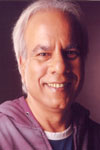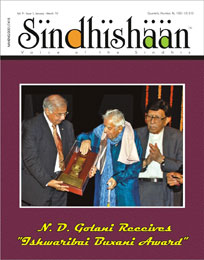A CONTRARIAN PERSPECTIVE
– A Conversation with a Sindhi Youngster
By Arun Babani

ME : Tell me something…are you a Sindhi?
HE : Well…Yes and no.
ME : How do you mean?
HE : I am a Sindhi by birth having been born to Sindhi parents..but as far as language and culture is concerned, I'm not a Sindhi…because I don't think like a normal Sindhi…don't talk like him..don't behave like him…well, this is not a judgement on the regular Sindhi guy, its just that I don't identify with him.
ME : So you don't miss being a Sindhi?
HE : Not at all. On the contrary I feel I have lived a better life…on better terms and acquired a better culture.
ME : How do define culture?
HE : Everything that is me… my thoughts, feelings, attitudes, behaviour and surroundings..you can see sir, I don't even have the looks of a Sindhi…
ME : So the culture that you have lived in, you think is better than what most Sindhi youth find themselves in?
HE : Certainly! Most of my Sindhi friends are rather meek and subdued..
ME : You think that is because of the Sindhi culture?
HE : Must be…I don't know. I know that Sindhis are normally too flashy and insecure and arrogant people. No polish…No style. Right sir?
ME : Go on..
HE : But the kind of cosmopolitan culture of the big city that I grew up in is certainly more chilled out and on the go. One thing I have noticed about Sindhis of my age is that they are a worried lot…Worrying about parents…about neighbours…burdened. They lack confidence and sense of humour.
ME : Is it? Why is it that so?
HE : I suppose because the culture in Sindhi households is quite conservative…with great expectations from children to perform well.
ME : But I thought that this so in every Indian community.
HE : Yes, it must be…but Sindhis tend to go too far to manipulate and control children's emotions…Sindhi parents expect their sons to marry according to their choice, strictly within the community, obeying all their calculations about dowry and status…these issues make Sindhi youngsters heavy and stressed out…Don't you think so sir?
ME : Perhaps…but tell me, if you were given to learn Sindhi language in easy steps would you go for it?
HE : Why should I learn Sindhi language? I can understand learning computers. Management, or even Marathi because that would be great help in my CV at the time of applying for a job…But Sindhi…Where will I use it? People learn French or German when they have to visit those countries, I'm not even allowed to go to Sindh, so what's the point of learning Sindhi?
ME : True.
HE : As for culture, I have learnt a better, modernized and sophisticated culture of my own…I call it the Global culture. In my college I can speak to any nationality with a pride that I am a world citizen…Take music…I can relate to all sorts of world music…classical, pop, jazz…I heard a Sindhi song…it sounded more like folk music from villages…I don't know about Sindhi literature but I remember watching a Sindhi play on TV once…again too old fashioned, talking about dowry and so on…
ME : So you don't find anything of value in Sindhi culture?
HE : Its not that sir. I believe all human cultures and societies deep down are the same. With almost similar concerns of survival, raising a family, fearing Gods, expanding one's fortunes…all these issues are a common human heritage. So basically all human culture, irrespective of nationality and language, speak, think, feel and experience the same things, whether in Russia, Africa or India. The sight of currency or a nude body will excite a man of any nationality on the earth…!
ME : Roots? Tell me how you understand roots of a person?
HE : My parents roots are in Karachi, mine are in Mumbai. So if I forcibly move away from Mumbai, I would miss Mumbai not Karachi….Simply because I was born and brought up here.
ME : There is something like genetic roots of a community,… the ancestors and so on..
HE : Yes, the ancestors of the whole of humanity ultimately are one. In the beginning there was no India, America or China. Man's common ancestral roots are in the genes, so there are no Sindhi roots, or Gujarati roots. Genetic roots go beyond nationalities, communities and castes. Is that not so sir…?
ME : So you think that there is no need to preserve Sindhi culture?
HE : By all means preserve it. Save it in museums and libraries. But for God's sake please don't force any one to adopt it. The youth will reject Sindhi culture in its old format. It is like putting a college student back to KG. You'll choke him. He'll get suffocated. Today's youngsters have to compete with Americans, Chinese, Australians…It is a common world market of values, talents and qualities,Sindhi culture doesn't stand a chance, take it from me. Isn't that the reason why so many Sindhis are converting to Christianity to stand a better chance…?
ME : So you feel that the Sindhi culture can disappear…?
HE : I think insecure and frightened people hold on to such things like language and culture…Please excuse me…Isn't that enough that we are all human beings, sharing a human way of life…I think what matters is to strive to be a good, noble and intelligent human being rather than being called a Sindhi, Gujarati or Marwari…
ME : But what about distinct Sindhi identity…?
HE : Why do we need that? Why should there be a distinct Sindhi identity? Once upon a time, back in Sindh it existed. But the political and social environment changed all that…Perhaps you can say that destiny doesn't want a distinct Sindhi identity…
ME : So you call yourself destiny's child…without culture
HE : Without restrictions…If you ask Rishis and Sages they'll tell you that the culture is the real bondage of man. The real reason behind all this misery and wars, because it is the culture that restricts and conditions the natural human energies of man. These classifications on the basis of caste, culture and community are dangerous in today's homogenous world culture, they are mostly the weapons the politicians use to win elections. These things divide humanity, create walls…But hopefully and thankfully all these topics will become things of the past…the future has no place in it for them…The future says 'One Earth…One World…One Humanity'
Although Arun Babani has conjured up a fictional dialogue the possibility of it falling under the realm of reality is certainly probable. How does one react? What emotions does this generate? And mind you, this is not a Sindhi – specific phenomenon but has wider implications encompassing all Indian languages as is evident from the following article appearing in The Crest Edition of The Times Of India.
SindhiShaan invites its readers to express their views on this issue.
Ranjit Butani


